Effects of Late-Night Workouts on Sleep Quality
Discover the effects of late-night workouts on sleep and learn how to optimize your exercise routine for better sleep quality. Explore the latest research findings and share your experiences with our community.
FITNESS
Selah Creatives
5/19/20243 min read


Late-night workouts have become increasingly popular among individuals seeking to squeeze in exercise sessions after a long day of work or responsibilities. While exercising at any time of day offers numerous health benefits, including improved mood, increased energy levels, and enhanced physical fitness, many people wonder about the effects of late-night workouts on sleep quality. In this comprehensive guide, we'll delve into the impact of late-night workouts on sleep and explore strategies for optimizing your exercise routine to promote better sleep quality and overall well-being.
Understanding the Effects of Late-Night Workouts on Sleep
Increased Alertness: Exercise has been shown to increase alertness and arousal levels, which can make it difficult to wind down and fall asleep after a late-night workout. Intense physical activity stimulates the release of adrenaline and cortisol, hormones that promote wakefulness and alertness, making it challenging for the body to transition into a state of relaxation conducive to sleep.
Disrupted Sleep Patterns: Engaging in vigorous exercise close to bedtime can disrupt the body's natural sleep-wake cycle and interfere with sleep onset and duration. Research has shown that late-night workouts can lead to prolonged sleep latency, decreased total sleep time, and fragmented sleep patterns, resulting in poorer sleep quality overall.
Delayed Thermoregulation: Exercise raises the body's core temperature, which can delay the onset of sleep by inhibiting the natural drop in body temperature that occurs during the evening hours. This delay in thermoregulation can prolong the time it takes to fall asleep and contribute to sleep disturbances throughout the night.
Strategies for Optimizing Your Exercise Routine for Better Sleep
Timing Is Key: Aim to complete your workout at least 2-3 hours before bedtime to allow your body sufficient time to cool down and relax before sleep. Exercising earlier in the day, such as in the morning or afternoon, may be more conducive to promoting restful sleep by avoiding the stimulatory effects of late-night workouts.
Choose the Right Intensity: Opt for moderate-intensity exercises, such as brisk walking, cycling, or yoga, in the hours leading up to bedtime. Avoid high-intensity interval training (HIIT) or heavy weightlifting close to bedtime, as these activities can elevate heart rate and cortisol levels, making it harder to wind down and fall asleep.
Create a Relaxing Wind-Down Routine: Incorporate calming activities into your pre-sleep routine to help signal to your body that it's time to relax and prepare for sleep. Practice mindfulness techniques, such as deep breathing or meditation, listen to soothing music, or take a warm bath to promote relaxation and ease the transition into sleep.
Latest Research Findings on Late-Night Workouts and Sleep Quality
Recent studies have shed light on the complex relationship between late-night workouts and sleep quality, highlighting the importance of individual differences in exercise tolerance and sleep sensitivity. Research conducted at leading sleep laboratories has shown that while some individuals may experience minimal sleep disruption from late-night exercise, others may be more susceptible to sleep disturbances and impaired sleep quality.
Join the Conversation: Share Your Exercise and Sleep Experiences
We invite you to share your experiences, tips, and questions related to late-night workouts and sleep quality with our community. Whether you've found success with a particular exercise routine or have questions about optimizing your workout schedule for better sleep, your contributions are valuable in fostering understanding and support for individuals seeking to balance exercise and sleep.
Conclusion: Finding the Right Balance for Better Sleep
While late-night workouts can offer numerous health benefits, including improved fitness and stress relief, it's essential to consider their potential impact on sleep quality. By understanding the effects of late-night exercise on sleep and implementing strategies to optimize your workout routine, you can strike the right balance between staying active and prioritizing restful sleep. Listen to your body, experiment with different exercise timings and intensities, and prioritize sleep as an integral part of your overall health and well-being.
Dubai, United Arab Emirates
Disclaimer: Some of the posts on this website may contain affiliate links. This means that if you click on certain links and make a purchase, we may earn a commission at no additional cost to you.
Your support through clicking on these affiliate links helps us to maintain and improve this website for our readers. We genuinely appreciate your support.
